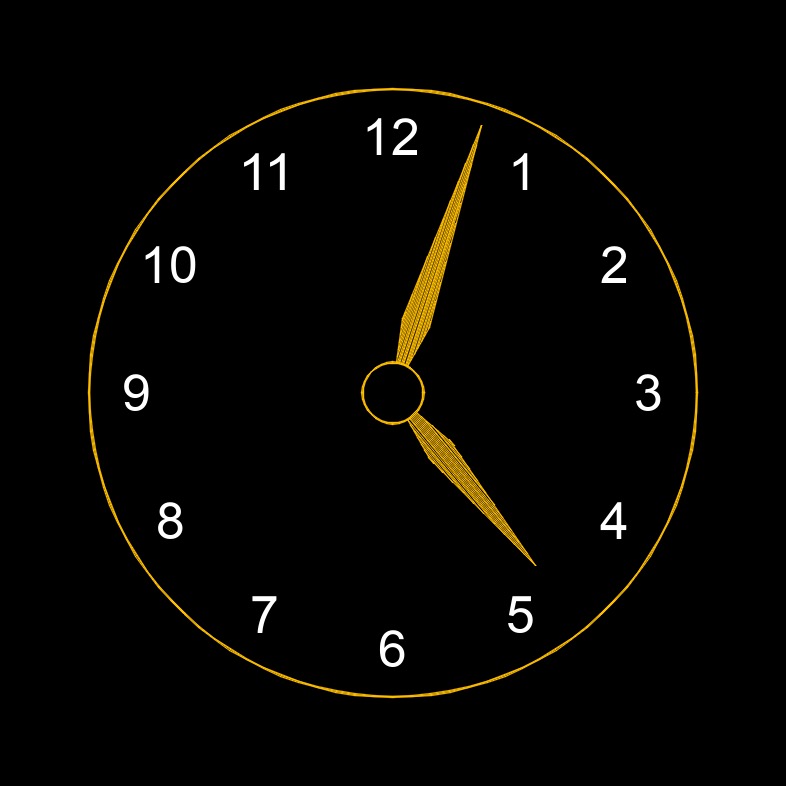Time
time with Displacement formula |
||
|
\( t \;=\; \dfrac{ d }{ s }\) (Time with Displacement) \( d \;=\; t \cdot s \) \( s \;=\; \dfrac{ d }{ t }\) |
||
| Symbol | English | Metric |
| \( t \) = Time | \(sec\) | \(s\) |
| \( d \) = Displacement | \(ft\) | \(m\) |
| \( s \) = Speed | \(ft \;/\; sec\) | \(m \;/\; s\) |
 Time, abbreviated as \(t\), is a fundamental concept in physics and is often described as the fourth dimension. It is a dimension in which events occur in a sequence, from the past through the present and into the future. In physics, time is often considered to be relative and can be affected by factors such as gravity and velocity. The passage of time can be measured using various methods, such as with a clock or with the decay of radioactive materials.
Time, abbreviated as \(t\), is a fundamental concept in physics and is often described as the fourth dimension. It is a dimension in which events occur in a sequence, from the past through the present and into the future. In physics, time is often considered to be relative and can be affected by factors such as gravity and velocity. The passage of time can be measured using various methods, such as with a clock or with the decay of radioactive materials.
time with Power formula |
||
|
\( t \;=\; \dfrac{ F \cdot d }{ P }\) (Time with Power) \( F \;=\; \dfrac{ t \cdot P }{ d }\) \( d \;=\; \dfrac{ t \cdot P }{ F }\) \( P \;=\; \dfrac{ F \cdot d }{ t }\) |
||
| Symbol | English | Metric |
| \( t \) = Time | \(sec\) | \(s\) |
| \( F \) = Force | \(lbf\) | \(N\) |
| \( d \) = Displacement | \(ft\) | \(m\) |
| \( P \) = Power | \(W\) | \(kg-m^2 \;/\; s^3\) |
In physics, time can be used to describe the motion of objects, the behavior of waves, and the evolution of physical systems. The concept of time is also important in many other fields, including philosophy, biology, and psychology. It is a fundamental part of human experience and plays a crucial role in our understanding of the world around us.

time with Work formula |
||
|
\( t \;=\; \dfrac{ W }{ P }\) (Time with Work) \( W \;=\; t \cdot P \) \( P \;=\; \dfrac{ W }{ t }\) |
||
| Symbol | English | Metric |
| \( t \) = Time | \(sec\) | \(s\) |
| \( W \) = Work | \(lbf-ft\) | \(J\) |
| \( P \) = Power | \(W\) | \(kg-m^2 \;/\; s^3\) |
Time Conversion Table | ||
|---|---|---|
| Multiply | By | To get |
| time (seconds) | 0,000 000 000 000 000 000 000 001 | yoctosecond (ys) |
| 0,000 000 000 000 000 000 001 | zeptosecond (zs) | |
| 0,000 000 000 000 000 001 | attosecond (as) | |
| 0,000 000 000 000 001 | femtosecond (fs) | |
| 0,000 000 000 001 (trillionth) | picosecond (ps) | |
| 0,000 000 001 (billionth) | nanosecond (ns) | |
| 0,000 001 (millionth) | microsecond (us) | |
| 0,001 (thousandth) | millisecond (ms) | |
| 0.01 (hundredth) | centisecond (cs) | |
| 1 | second (s) | |
| time (year) | 60 seconds | 1 minute (mean solar) |
| 59.83617 seconds | 1 minute (sidereal) | |
| 60 minutes | 1 hour | |
| 24 hours | 1 day | |
| 3,600 seconds | 1 hour | |
| 86,400 seconds | 1 day (mean solar) | |
| 86,164.09 seconds | 1 day (sidereal) | |
| 7 days | 1 week | |
| 168 hours | 1 week | |
| 14 days | 1 fortnight | |
| 28, 29, 30 or 31 days | 1 month | |
| 365 days | 1 year | |
| 366 days | 1 leap year | |
| 12 months | 1 year | |
| 31,536,000 seconds | 1 year (calendar) | |
| 31,558,150 seconds | 1 year (sidereal) | |
| 31,556,930 seconds | 1 year (tropical) | |
| 9,460,550,000,000,000 meters | 1 light year | |
| 299,792,458 meters per sec (m/s) | speed of light | |
| parsec | approx. 3.25 light years | |
| time (years) | biennial | 2 |
| triennial | 3 | |
| quadrennial | 4 | |
| quinquennial | 5 | |
| hexennial | 6 | |
| septennial | 7 | |
| octennial | 8 | |
| novennial | 9 | |
| decennial | 10 | |
| hendecennial | 11 | |
| duodecennial | 12 | |
| tredecennial | 13 | |
| quindecennial | 15 | |
| sextodecennial | 16 | |
| septendecennial | 17 | |
| vigintennial | 20 | |
| trigentennial | 30 | |
| quadragennial | 40 | |
| quinquagenary | 50 | |
| sexagennial | 60 | |
| septuagennial | 70 | |
| octogintennial | 80 | |
| nonagintennial | 90 | |
| centennial | 100 | |
| sesquicentennial | 150 | |
| bicentennial | 200 | |
| tercentennial | 300 | |
| quatercentenary | 400 | |
| quincentennial | 500 | |
| sexcentennial | 600 | |
| septcentennial | 700 | |
| octocentennial | 800 | |
| nanacentennial | 900 | |
| millenial | 1,000 | |
